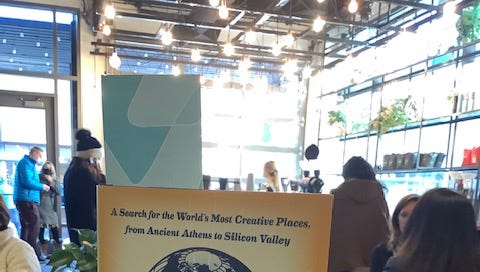The Genius of a Nomadic Life
I’ve long embraced a nomadic existence — visited 46 of the 50 U.S. states; enjoyed random encounters and uncommon discoveries; lived free of material encumbrances.
Over time I have found this experiential immersion quest to be an accelerant for creativity. Most notably, coffeehouses and bookstores have become for me ecosystems of expansionary thoughts and new creative ideas.
With many pandemic restrictions having been lifted, I am now back on the road championing human connection one book at a time, through “Great Books, Great Minds.” My community of book enthusiasts is growing at a rapid clip worldwide as I traverse the landscape for voracious readers.
One of my trip companions is The Geography of Genius, the Literati Book Club selection for the month of February. It has been the perfect read for me in terms of fueling ideas around place + community + great books.
Given my steady embrace of a life of mystery and paradox, I really resonated with the words of travel writer and author Eric Weiner who’s noted that “a little bit of chaos is good.”
In the book, Weiner unearths the inner connection between our surroundings and innovative ideas. Replete with a historic context of places like Vienna, Renaissance Florence, ancient Athens, Song Dynasty Hangzhou, and California’s Silicon Valley, he highlights how certain built environments are incubators of creative expression.
Weiner captured his insights by vicariously walking along the same geographical path of geniuses like Michelangelo, Socrates, and Leonardo who made their mark in these settings.
His mantra: “What was in the air, and can we bottle it?”
This connection of dots can be seen throughout history: Darwin’s clarity around evolution came while riding around in a carriage; Freud percolated many profound ideas while sitting at a coffeehouse; Beethoven captured his music flow while ambulating in nature.
Witty and inspiring, The Geography of Genius adroitly captures through an enlightening exegesis of history the critical nature of culture in igniting creativity. As Weiner says:
"This is a book about process, about how creative genius happens and what are the circumstances. I believe in the power of place and the power of culture to shape our lives in unexpected ways."
Jet setting the globe, Weiner examined locales and cultures that cultivated some of the greatest minds in history. Through his travels, he captured a mosaic of key factors he asserts fostered what he affectionately calls “genius clusters” which are characterized by money, diversity, competition, and disorder.
As I resume my travels, I find myself thinking often about what genius personally means to me and how I aspire to achieve it. To this point, one of my longstanding legacy goals is to be awarded a MacArthur Fellowship, otherwise known as a Genius Grant. Because invitations are granted through a blind nomination process, only those who have been recommended by one of MacArthur's constantly changing pool of outside nominators can be considered.
It’s here where I’m inspired by Werner who has said:
"The pot has to be stirred. If you are fully invested in the status quo—either as a person or a place—you are unlikely to create genius because you are too comfortable."




